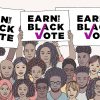Banging your head against the wall when voter turnout is too low?
Worry no more, fam, we’ve got a magic potion for you: mandatory voting.
No more excuses. No more rich folks across town getting better everything because they had more money to put in a politician’s pocket. No more whining about the cats who took over Congress when you chose binge-watching Netflix over exercising your civic duty. And, most of all, no more out-of-whack overrepresentation of certain population groups because more than 30 states across the nation have kept making your right to vote so damn complicated.
President Obama has opened up a fresh and sorely needed conversation about making your vote required by law.
“It would be transformative if everybody voted—that would counteract money more than anything,” POTUS said while answering town hall questions at the City Club of Cleveland recently, adding that it was the first time he had shared the idea publicly.
“The people who tend not to vote are young, they’re lower income, they’re skewed more heavily towards immigrant groups and minority groups,” he added.
Florida Republican and all-in GOP presidential primary combatant Sen. Marco Rubio (R-Fla.) couldn’t hold back a response. “I don’t put anything past him,” Rubio said on Fox News, pushing the “King Obama” narrative. “Not voting is also a legitimate choice that some people make. That is the choice of living in a free society.”
Mandatory voting, for reference, is not an unusual thing. Twenty-two countries do it, including such significant ones as Australia, Brazil and Singapore. And although critics of compulsory voting are certain to point out the few bad apples such as Egypt and Thailand, it’s still hard to ignore track records of relative stability among most on that list.
At least the Australian model—which includes a small $20 fine for not voting—is something worth emulating. Questions for critics who wave the “free choice” banner remain: How exactly does it hurt anyone? And if voting is the essential pillar of a functional democracy, how exactly is it undemocratic?
There are actually far more questions about the arguments against mandatory voting.
“What law would it be violating? What constitutional right?” Michele Jawando, vice president of the Center for American Progress Legal Progress project, asked in a conversation with The Root. “I would be hard-pressed to see how it violates a choice when taxes are already a compulsory action.
“So why not voting?” she added.
It’s an important question. Even conservatives, who have built an entire ideological movement around tax cuts, have enough sense not to demand no taxes. We seem comfortable with the notion of compulsory money snatched out of our hard-earned paychecks by state, local and federal government agencies.
And although many of us grumble about it, we don’t mind paying stuff like property taxes or being compelled to pay for car insurance. Some of us send our kids to private school while still paying property taxes for public schools.
Clearly, we have a problem with voter turnout: The 2014 congressional midterms showed turnout at its lowest in 72 years. Many of us frowned when boastful Republicans, basking in the victory of a recaptured Senate majority and an expanded caucus in the House, bragged about a voter “mandate.” What mandate, son?? Barely 37 percent of eligible voters participated. And check out how turnout has dipped over the years in this graph.
Eventually more people get hurt, disenfranchised or marginalized in our current system of optional voting than they would if voting were mandatory. Optional voting supports a political system in which 62 percent of the population, which is white, controls 86 percent of the U.S. Congress—with no end to that in sight even as the population is poised to turn majority people of color by 2050. Even with urban areas representing the highest concentrations of black, Latino and Asian populations, whites still hold a staggering 90 percent of all local elected offices, according to a recent study by the Joint Center for Political and Economic Studies (pdf). That could explain why inequality continues to rise in the 50 largest U.S. cities.
But maybe that’s why so many Republicans—along with quite a lot of white people—are scared to make the voting thing compulsory. Maybe that’s the point: That’s handing over too much power.
Mandatory voting may not be a panacea, but how bad can it be compared with the increasing pace of racial, income, gender and education disparities brought on by a woeful lack of optional voting? Look, it’s simple. Here we are arguing, endlessly, about how people should register or if they should register at all (with municipalities and states spending critical dollars enforcing voter-ID and -suppression laws for a voter-fraud problem that, statistically, doesn’t exist) when we could solve it in one big compulsory voting law. And how bad is a $20 fine for not voting, compared with the time spent, wages lost, fees in paperwork spent and the stress in doing something as simple as registering to vote?
That’s a no-brainer I can sign on to. So, when do we get started?
Charles D. Ellison is a veteran political strategist and regular contributor to The Root. He is also Washington correspondent for the Philadelphia Tribune, chief political correspondent for Uptown magazine, Sunday Washington insider for WDAS-FM in Philadelphia and a panelist on MSNBC’s Hardball With Chris Matthews. Follow him on Twitter.














